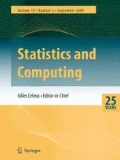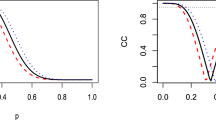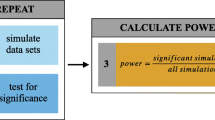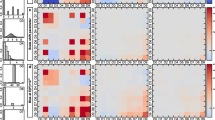Abstract
This article presents a novel Laplace-based algorithm that can be used to find Bayesian adaptive designs under model and parameter uncertainty. Our algorithm uses Laplace importance sampling to provide a computationally efficient approach to undertake adaptive design and inference when compared to standard approaches such as those based on the sequential Monte Carlo (SMC) algorithm. Like the SMC approach, our new algorithm requires very little problem-specific tuning and provides an efficient estimate of utility functions for parameter estimation and/or model choice. Further, within our algorithm, we adopt methods from Pareto smoothing to improve the robustness of the algorithm in forming particle approximations to posterior distributions. To evaluate our new adaptive design algorithm, three motivating examples from the literature are considered including examples where binary, multiple response and count data are observed under considerable model and parameter uncertainty. We benchmark the performance of our new algorithm against: (1) the standard SMC algorithm and (2) a standard implementation of the Laplace approximation in adaptive design. We assess the performance of each algorithm through comparing computational efficiency and design selection. The results show that our new algorithm is computationally efficient and selects designs that can perform as well as or better than the other two approaches. As such, we propose our Laplace-based algorithm as an efficient approach for designing adaptive experiments.













Similar content being viewed by others
References
Antognini, A.B., Giovagnoli, A.: Adaptive Designs for Sequential Treatment Allocation. Chapman and Hall/CRC, New York (2015)
Barz, T., López, D.C., Bournazou, M.N.C., Körkel, S., Walter, S.F.: Real-time adaptive input design for the determination of competitive adsorption isotherms in liquid chromatography. Comput. Chem. Eng. 94, 104–116 (2016)
Beck, J., Dia, B.M., Espath, L.F., Long, Q., Tempone, R.: Fast Bayesian experimental design: Laplace-based importance sampling for the expected information gain. Comput. Methods Appl. Mech. Eng. 334, 523–553 (2018)
Bernardo, J.M., Smith, A.F.M.: Bayesian Theory, 2nd edn. Wiley, Hoboken (2000)
Borth, D.M.: A total entropy criterion for the dual problem of model discrimination and parameter estimation. J. R. Stat. Soc.: Ser. B (Methodol.) 37(1), 77–87 (1975)
Brinch, C.: Simulated maximum likelihood using tilted importance sampling. Discussion papers, Statistics Norway, Research Department (2008). https://www.ssb.no/a/publikasjoner/pdf/DP/dp540.pdf
Byrd, R.H., Lu, P., Nocedal, J., Zhu, C.: A limited memory algorithm for bound constrained optimization. SIAM J. Sci. Comput. 16(5), 1190–1208 (1995)
Cavagnaro, D.R., Myung, J.I., Pitt, M.A., Kujala, J.V.: Adaptive design optimization: a mutual information-based approach to model discrimination in cognitive science. Neural Comput. 22(4), 887–905 (2010)
Clark, N.J., Dixon, P.M.: An extended Laplace approximation method for Bayesian inference of self-exciting spatial-temporal models of count data (2017). arXiv:1709.09952 [stat.CO]
Del Moral, P., Doucet, A., Jasra, A.: Sequential Monte Carlo samplers. J. R. Stat. Soc.: Ser. B (Stat. Methodol.) 68(3), 411–436 (2006)
Denman, N.G., McGree, J.M., Eccleston, J.A., Duffull, S.B.: Design of experiments for bivariate binary responses modelled by Copula functions. Comput. Stat. Data Anal. 55(4), 1509–1520 (2011)
Doucet, A., Godsill, S., Andrieu, C.: On sequential Monte Carlo sampling methods for Bayesian filtering. Stat. Comput. 10(3), 197–208 (2000)
Dror, H.A., Steinberg, D.M.: Sequential experimental designs for generalized linear models. J. Am. Stat. Assoc. 103(481), 288–298 (2008)
Drovandi, C.C., Pettitt, A.N.: Estimation of parameters for macroparasite population evolution using approximate Bayesian computation. Biometrics 67(1), 225–233 (2011)
Drovandi, C.C., McGree, J.M., Pettitt, A.N.: Sequential Monte Carlo for Bayesian sequentially designed experiments for discrete data. Comput. Stat. Data Anal. 57(1), 320–335 (2013)
Drovandi, C.C., McGree, J.M., Pettitt, A.N.: A sequential Monte Carlo algorithm to incorporate model uncertainty in Bayesian sequential design. J. Comput. Graph. Stat. 23(1), 3–24 (2014)
Feng, C., Marzouk, Y.M.: A layered multiple importance sampling scheme for focused optimal Bayesian experimental design (2019). arXiv:1903.11187 [stat.CO]
Fenlon, J.S., Faddy, M.J.: Modelling predation in functional response. Ecol. Model. 198, 154–162 (2006)
Foster, A., Jankowiak, M., Bingham, E., Horsfall, P., Teh, Y.W., Rainforth, T., Goodman, N.: Variational optimal experiment design: efficient automation of adaptive experiments (2019). arXiv:1903.05480 [stat.ML]
Holling, C.S.: Some characteristics of simple types of predation and parasitism. Can. Entomol. 91(7), 385–398 (1959)
Huan, X., Marzouk, Y.M.: Sequential Bayesian optimal experimental design via approximate dynamic programming (2016). arXiv:1604.08320 [stat.ME]
Jaakkola, T.S., Jordan, M.I.: Bayesian parameter estimation via variational methods. Stat. Comput. 10(1), 25–37 (2000). https://doi.org/10.1023/A:1008932416310
Kuk, A.Y.C.: Laplace importance sampling for generalized linear mixed models. J. Stat. Comput. Simul. 63(2), 143–158 (1999)
Kullback, S., Leibler, R.A.: On information and sufficiency. Ann. Math. Stat. 22(1), 79–86 (1951)
Lewi, J., Butera, R., Paninski, L.: Sequential optimal design of neurophysiology experiments. Neural Comput. 21(3), 619–687 (2009)
Liu, J.S.: Monte Carlo Strategies in Scientific Computing. Springer, New York (2008)
Long, Q., Scavino, M., Tempone, R., Wang, S.: Fast estimation of expected information gains for Bayesian experimental designs based on Laplace approximations. Comput. Methods Appl. Mech. Eng. 259, 24–39 (2013)
Long, Q., Scavino, M., Tempone, R., Wang, S.: A Laplace method for under-determined Bayesian optimal experimental designs. Comput. Methods Appl. Mech. Eng. 285, 849–876 (2015)
McGree, J.M.: Developments of the total entropy utility function for the dual purpose of model discrimination and parameter estimation in Bayesian design. Comput. Stat. Data Anal. 113, 207–225 (2017)
McGree, J.M., Drovandi, C.C., Thompson, M., Eccleston, J., Duffull, S., Mengersen, K., Pettitt, A.N., Goggin, T.: Adaptive Bayesian compound designs for dose finding studies. J. Stat. Plan. Inference 142(6), 1480–1492 (2012)
McGree, J.M., Drovandi, C.C., White, G., Pettitt, A.N.: A pseudo-marginal sequential Monte Carlo algorithm for random effects models in Bayesian sequential design. Stat. Comput. 26(5), 1121–1136 (2016)
Moffat, H., Hainy, M., Papanikolaou, N.E., Drovandi, C.C.: Sequential experimental design for functional response experiments (2019). arXiv:1907.02179 [stat.AP]
Müller, P., Berry, D.A., Grieve, A.P., Krams, M.: A Bayesian decision-theoretic dose-finding trial. Decis. Anal. 3(4), 197–207 (2006)
Nelsen, R.B.: An Introduction to Copulas. Springer Series in statistics, 2nd edn. Springer, New York (2006)
Ogden, H.: On the error in Laplace approximations of high-dimensional integrals (2018). arXiv:1808.06341 [math.ST]
Ormerod, J.T., Wand, M.P.: Explaining variational approximations. Am. Stat. 64(2), 140–153 (2010). https://doi.org/10.1198/tast.2010.09058
Overstall, A.M., Woods, D.C.: Bayesian design of experiments using approximate coordinate exchange. Technometrics 59(4), 458–470 (2017)
Overstall, A.M., McGree, J.M., Drovandi, C.C.: An approach for finding fully Bayesian optimal designs using normal-based approximations to loss functions. Stat. Comput. 28(2), 343–358 (2018a)
Overstall, A.M., Woods, D.C., Adamou, M.: acebayes: an R package for Bayesian optimal design of experiments via approximate coordinate exchange (2018b). arXiv:170508096
Palmer, J.L., Müller, P.: Bayesian optimal design in population models for haematologic data. Stat. Med. 17(14), 1613–1622 (1998)
Prakash, O., Datta, B.: Sequential optimal monitoring network design and iterative spatial estimation of pollutant concentration for identification of unknown groundwater pollution source locations. Environ. Monit. Assess. 185(7), 5611–5626 (2013)
Raudenbush, S.W., Yang, M.L., Yosef, M.: Maximum likelihood for generalized linear models with nested random effects via high-order, multivariate Laplace approximation. J. Comput. Graph. Stat. 9(1), 141–157 (2000)
Roy, S., Notz, W.I.: Estimating percentiles in computer experiments: a comparison of sequential-adaptive designs and fixed designs. J. Stat. Theory Pract. 8(1), 12–29 (2014)
Ryan, K.: Estimating expected information gains for experimental designs with application to the random fatigue-limit model. J. Comput. Graph. Stat. 12, 585–603 (2003)
Senarathne, S.G.J., Drovandi, C.C., McGree, J.M.: Bayesian sequential design for Copula models. TEST (2019). https://doi.org/10.1007/s11749-019-00661-7
Shun, Z., McCullagh, P.: Laplace approximation of high dimensional integrals. J. R. Stat. Soc.: Ser. B (Methodol.) 57(4), 749–760 (1995)
Skaug, H.J., Fournier, D.A.: Automatic approximation of the marginal likelihood in non-Gaussian hierarchical models. Comput. Stat. Data Anal. 51(2), 699–709 (2006)
Stroud, J.R., Muller, P., Rosner, G.L.: Optimal sampling times in population pharmacokinetic studies. J. R. Stat. Soc.: Ser. C (Appl. Stat.) 50(3), 345–359 (2001)
Vehtari, A., Simpson, D., Gelman, A., Yao, Y., Gabry, J.: Pareto smoothed importance sampling (2017). arXiv:1507.02646 [stat.CO]
Vehtari, A., Gelman, A., Gabry, J., Yao, Y., Bürkner, P.C., Goodrich, B., Piironen, J., Magnusson, M.: loo: efficient leave-one-out cross-validation and WAIC for Bayesian models (2019). https://CRAN.R-project.org//package=loo, R package version 2.1.0
Wakefield, J.: An expected loss approach to the design of dosage regimens via sampling-based methods. J. R. Stat. Soc. Ser. D (Stat.) 43(1), 13–29 (1994)
Weir, C.J., Spiegelhalter, D.J., Grieve, A.P.: Flexible design and efficient implementation of adaptive dose-finding studies. J. Biopharm. Stat. 17(6), 1033–1050 (2007)
Acknowledgements
SGJS was supported by QUTPRA scholarship from the Queensland University of Technology. CCD was supported by an Australian Research Council Discovery Project (DP200102101). JMM was supported by an Australian Research Council Discovery Project (DP200101263). Computational resources and services used in this work were provided by the HPC and Research Support Group, Queensland University of Technology, Brisbane, Australia.
Author information
Authors and Affiliations
Corresponding author
Additional information
Publisher's Note
Springer Nature remains neutral with regard to jurisdictional claims in published maps and institutional affiliations.
Appendix
Appendix
Rights and permissions
About this article
Cite this article
Senarathne, S.G.J., Drovandi, C.C. & McGree, J.M. A Laplace-based algorithm for Bayesian adaptive design. Stat Comput 30, 1183–1208 (2020). https://doi.org/10.1007/s11222-020-09938-6
Received:
Accepted:
Published:
Issue Date:
DOI: https://doi.org/10.1007/s11222-020-09938-6







